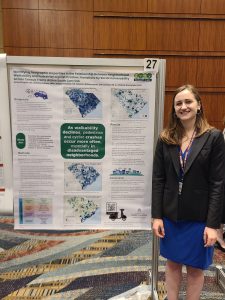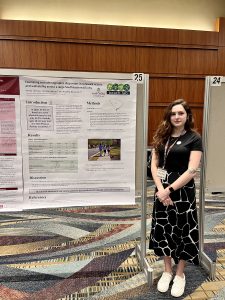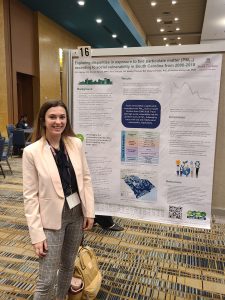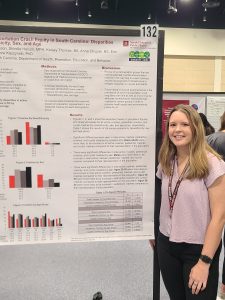On April 21, 2023, several members of the BEACH Lab participated in USC’s celebration of student research, Discover USC. Dr. Kaczynski served as a judge and enjoyed learning more about diverse students’ research through the process. As well, multiple students in the BEACH Lab presented their research projects from the past year and took home numerous awards. Read on to learn more below!

Anna Chupak

Anna Chupak, a first-year PhD student in the Department of Health Promotion, Education, and Behavior and a member of the BEACH lab, presented a poster on, “Identifying Geographic Disparities in the Relationship between Neighborhood Walkability and Pedestrian and Cyclist Crashes: Variations by Social Vulnerability Across Census Tracts Within South Carolina”. She examined the relationship between neighborhood walkability and pedestrian and cyclist crashes, including variations by social vulnerability (i.e., the degree of susceptibility of a community to hazards due to social conditions) across census tracts in SC. Anna compiled and analyzed data for all 1,103 census tracts in SC on neighborhood walkability scores from the Environmental Protection Agency (EPA), total number of pedestrian/cyclist crashes per trip from SC Department of Transportation, and social vulnerability index scores from the U.S. Census Bureau. The EPA walkability scores include key indicators for intersection density, proximity to transit, and land-use diversity. She found that as neighborhood walkability worsened, pedestrian and cyclist crashes increased among census tracts in SC, especially in more disadvantaged neighborhoods (i.e., neighborhoods with higher social vulnerability). The findings from her study will help identify neighborhoods in need of infrastructure improvements to address disparities in pedestrian and cyclist safety among census tracts in SC, thereby facilitating greater physical activity and reducing chronic diseases like obesity.
Kelsey Thomas

Kelsey Thomas, a second-year MPH student in the Department of Health Promotion, Education, and Behavior and member of the BEACH Lab, presented her work on “Examining sociodemographic disparities in sidewalk access and walkability across a large Southeastern US city.” She examined how multiple aspects of neighborhood walkability, as measured by sidewalk access and the National Walkability Index (NWI), vary according to race/ethnicity, education, and income within Columbia, South Carolina. Kelsey compiled and analyzed data from the American Community Survey (ACS), the NWI, and the City of Columbia GIS department using linear regression. She found that low-income neighborhoods and those with higher educational attainment were found to be more walkable and have greater sidewalk access. The findings from her study highlight the importance of monitoring inequities in neighborhood factors such as walkability and sidewalk access in promoting physical activity and addressing disparities in chronic disease.
Erin Looney

Erin Looney, a first-year MPH student in the Department of Health Promotion, Education, and Behavior and member of the BEACH Lab, presented her work on “Exploring disparities in exposure to fine particulate matter (PM2.5) according to social vulnerability in South Carolina from 2000-2018.” Through her study, Erin investigated the relationship between PM2.5 and overall social vulnerability in South Carolina from 2000-2018. Erin categorized overall social vulnerability percentile rankings into tertiles (low, middle, and high) to analyze temporal trends and disparities in PM2.5 for low, middle, and high social vulnerability from 2000-2018, controlling for rurality. She found that social vulnerability is significantly associated with PM2.5 levels in South Carolina over time. Tracts with high social vulnerability had the greatest levels of PM2.5, followed by tracts with low and middle social vulnerability, respectively. The findings of her study highlight disparities in PM2.5 and the potential need for local policy, environmental, and educational interventions to mitigate air pollution exposure risk for socially vulnerable populations.
Eleanor Witherspoon

Eleanor Witherspoon, a senior undergraduate Public Health major and member of the BEACH lab, presented on “Active transportation crash equity in South Carolina: Disparities by race/ethnicity, sex, and age”. Eleanor used data from the South Carolina Department of Transportation regarding crashes that involved a pedestrian and/or cyclist between 2011 and 2021. She ran descriptive statistics on the data using SPSS. Eleanor then used chi-square tests to compare the observed numbers of total active, pedestrian, and cyclist crashes for each demographic to the expected number, based on representation in the population. Black men were significantly more likely than other races/ethnicities and women to be involved in total active crashes, pedestrian crashes, and cyclist crashes when compared to their representation in the population. Ages 20-29 and 50-59 were more likely to be involved in total active crashes and cyclist crashes, compared to their representation in the population. Ages 20-29 and 30-39 were more likely to be involved in pedestrian crashes, compared to their representation in the population. The findings of her study highlight disparities in active transportation crashes in South Carolina and the need for more research on the topic and interventions to help promote equity.
